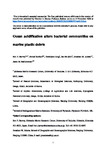Ocean acidification alters bacterial communities on marine plastic debris
| dc.contributor.author | Harvey, BP | |
| dc.contributor.author | Kerfahi, D | |
| dc.contributor.author | Jung, Y | |
| dc.contributor.author | Shin, J-H | |
| dc.contributor.author | Adams, JM | |
| dc.contributor.author | Hall-Spencer, Jason | |
| dc.date.accessioned | 2020-12-07T13:26:58Z | |
| dc.date.issued | 2020-12 | |
| dc.identifier.issn | 0025-326X | |
| dc.identifier.issn | 1879-3363 | |
| dc.identifier.other | 111749 | |
| dc.identifier.uri | http://hdl.handle.net/10026.1/16713 | |
| dc.description.abstract |
The increasing quantity of plastic waste in the ocean is providing a growing and more widespread novel habitat for microbes. Plastics have taxonomically distinct microbial communities (termed the 'Plastisphere') and can raft these unique communities over great distances. In order to understand the Plastisphere properly it will be important to work out how major ocean changes (such as warming, acidification and deoxygenation) are shaping microbial communities on waste plastics in marine environments. Here, we show that common plastic drinking bottles rapidly become colonised by novel biofilm-forming bacterial communities, and that ocean acidification greatly influences the composition of plastic biofilm assemblages. We highlight the potential implications of this community shift in a coastal community exposed to enriched CO2 conditions. | |
| dc.format.extent | 111749-111749 | |
| dc.format.medium | Print-Electronic | |
| dc.language | en | |
| dc.language.iso | en | |
| dc.publisher | Elsevier BV | |
| dc.subject | Bacteria | |
| dc.subject | Biofilm | |
| dc.subject | CO2 | |
| dc.subject | Ocean acidification | |
| dc.subject | Plastics | |
| dc.subject | Plastisphere | |
| dc.title | Ocean acidification alters bacterial communities on marine plastic debris | |
| dc.type | journal-article | |
| dc.type | Journal Article | |
| plymouth.author-url | https://www.webofscience.com/api/gateway?GWVersion=2&SrcApp=PARTNER_APP&SrcAuth=LinksAMR&KeyUT=WOS:000599843400004&DestLinkType=FullRecord&DestApp=ALL_WOS&UsrCustomerID=11bb513d99f797142bcfeffcc58ea008 | |
| plymouth.issue | Pt B | |
| plymouth.volume | 161 | |
| plymouth.publication-status | Published | |
| plymouth.journal | Marine Pollution Bulletin | |
| dc.identifier.doi | 10.1016/j.marpolbul.2020.111749 | |
| plymouth.organisational-group | /Plymouth | |
| plymouth.organisational-group | /Plymouth/Faculty of Science and Engineering | |
| plymouth.organisational-group | /Plymouth/Faculty of Science and Engineering/School of Biological and Marine Sciences | |
| plymouth.organisational-group | /Plymouth/PRIMaRE Publications | |
| plymouth.organisational-group | /Plymouth/REF 2021 Researchers by UoA | |
| plymouth.organisational-group | /Plymouth/REF 2021 Researchers by UoA/UoA07 Earth Systems and Environmental Sciences | |
| plymouth.organisational-group | /Plymouth/Research Groups | |
| plymouth.organisational-group | /Plymouth/Research Groups/Marine Institute | |
| plymouth.organisational-group | /Plymouth/Users by role | |
| plymouth.organisational-group | /Plymouth/Users by role/Academics | |
| dc.publisher.place | England | |
| dcterms.dateAccepted | 2020-10-06 | |
| dc.rights.embargodate | 2021-11-5 | |
| dc.identifier.eissn | 1879-3363 | |
| dc.rights.embargoperiod | Not known | |
| rioxxterms.funder | Japan Society for the Promotion of Science | |
| rioxxterms.identifier.project | JSPS KAKENHI | |
| rioxxterms.versionofrecord | 10.1016/j.marpolbul.2020.111749 | |
| rioxxterms.licenseref.uri | http://www.rioxx.net/licenses/all-rights-reserved | |
| rioxxterms.licenseref.startdate | 2020-12 | |
| rioxxterms.type | Journal Article/Review | |
| plymouth.funder | JSPS KAKENHI::Japan Society for the Promotion of Science |


